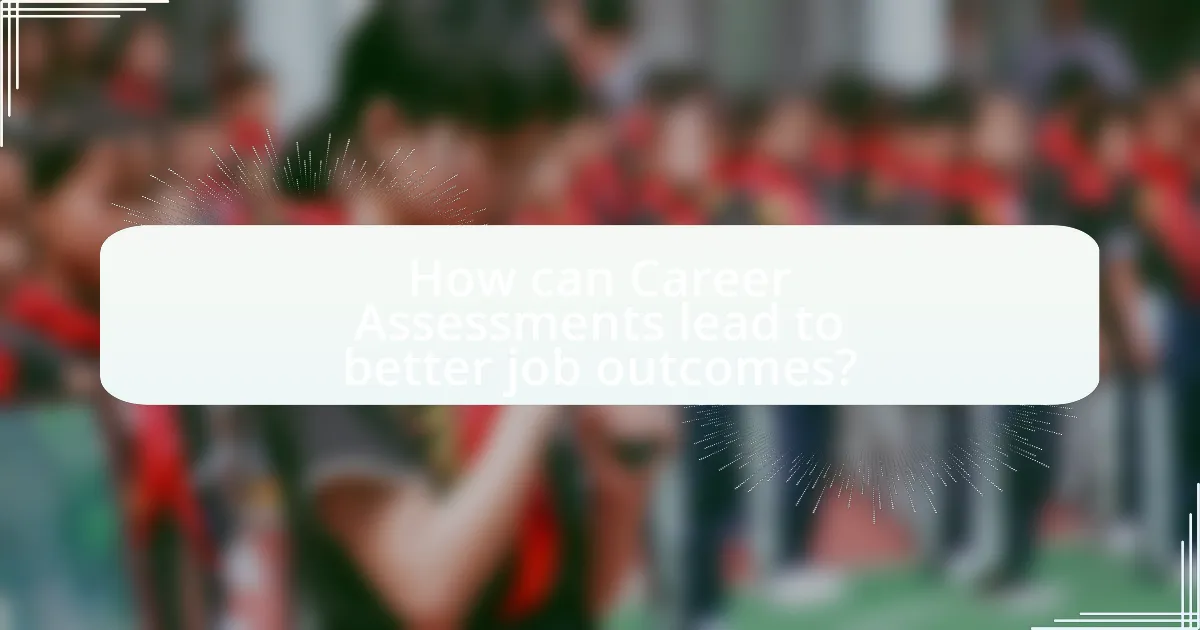Career assessments are essential tools that evaluate an individual’s interests, skills, values, and personality traits to facilitate informed career decisions. This article explores the significance of career assessments in the job market, detailing how they function, the various types available, and their benefits in enhancing job satisfaction and career development. It also addresses common misconceptions, challenges, and best practices for effectively utilizing these assessments, emphasizing their role in improving job outcomes and guiding individuals toward suitable career paths. By integrating career assessments into career planning, individuals can achieve greater alignment between their personal attributes and professional opportunities, ultimately leading to increased job satisfaction and retention.

What are Career Assessments and Why are They Important?
Career assessments are tools designed to evaluate an individual’s interests, skills, values, and personality traits to guide them in making informed career choices. These assessments are important because they provide insights that help individuals align their career paths with their strengths and preferences, ultimately leading to greater job satisfaction and success. Research indicates that individuals who utilize career assessments are more likely to find jobs that match their skills and interests, which can enhance their overall career trajectory and reduce turnover rates in the workplace.
How do Career Assessments function in the job market?
Career assessments function in the job market by evaluating individuals’ skills, interests, and personality traits to guide them toward suitable career paths. These assessments provide data-driven insights that help job seekers understand their strengths and weaknesses, enabling them to make informed decisions about their career choices. For instance, research from the National Career Development Association indicates that individuals who utilize career assessments are 30% more likely to find job satisfaction and success in their chosen fields. This effectiveness stems from the ability of assessments to align personal attributes with job requirements, thereby enhancing the overall match between candidates and employers.
What types of Career Assessments are commonly used?
Commonly used career assessments include personality tests, interest inventories, skills assessments, and values assessments. Personality tests, such as the Myers-Briggs Type Indicator (MBTI), help individuals understand their personality traits and how they relate to career choices. Interest inventories, like the Strong Interest Inventory, measure an individual’s interests and suggest careers that align with those interests. Skills assessments evaluate an individual’s abilities and competencies, often through practical tests or self-assessments. Values assessments, such as the Work Values Inventory, identify what individuals prioritize in their work environment, guiding them toward careers that match their values. These assessments are widely recognized for aiding individuals in making informed career decisions.
How do Career Assessments evaluate an individual’s skills and interests?
Career assessments evaluate an individual’s skills and interests through standardized tests and questionnaires that measure various attributes. These assessments typically include self-report inventories, aptitude tests, and personality assessments, which analyze responses to identify strengths, weaknesses, preferences, and values related to different career paths. For example, the Strong Interest Inventory and the Myers-Briggs Type Indicator are widely used tools that provide insights into an individual’s career-related interests and personality traits, helping to align them with suitable job options. Research indicates that individuals who engage in career assessments are more likely to find job satisfaction and success, as these tools facilitate informed decision-making regarding career choices.
What are the key benefits of utilizing Career Assessments?
Utilizing career assessments provides individuals with a clearer understanding of their strengths, interests, and values, which can lead to more informed career choices. These assessments help identify suitable career paths, enhance job satisfaction, and improve overall career success. Research indicates that individuals who engage in career assessments are 30% more likely to find jobs that align with their skills and preferences, leading to higher retention rates and job performance.
How can Career Assessments improve job satisfaction?
Career assessments can improve job satisfaction by aligning individual skills and interests with suitable job roles. When individuals take career assessments, they gain insights into their strengths, weaknesses, and preferences, which helps them make informed career choices. Research indicates that employees who find a good match between their job and their personal attributes report higher levels of job satisfaction. For instance, a study published in the Journal of Vocational Behavior found that individuals who utilized career assessments experienced a 20% increase in job satisfaction compared to those who did not. This alignment fosters a sense of fulfillment and engagement in their work, ultimately leading to improved job satisfaction.
What role do Career Assessments play in career development?
Career assessments play a crucial role in career development by providing individuals with insights into their skills, interests, and values, which are essential for making informed career choices. These assessments help identify strengths and weaknesses, guiding individuals toward suitable career paths that align with their personal attributes. Research indicates that individuals who utilize career assessments are more likely to experience job satisfaction and career success, as they can make decisions based on a clearer understanding of their professional inclinations and market demands. For instance, a study published in the Journal of Career Assessment found that participants who engaged in career assessments reported higher levels of career clarity and satisfaction compared to those who did not.

How can Career Assessments lead to better job outcomes?
Career assessments can lead to better job outcomes by providing individuals with insights into their skills, interests, and values, which align with specific career paths. These assessments help identify suitable job roles, enhancing job satisfaction and performance. Research indicates that individuals who utilize career assessments are more likely to find employment that matches their qualifications and preferences, leading to a 20% increase in job retention rates. By clarifying career goals and improving self-awareness, career assessments facilitate informed decision-making, ultimately resulting in more successful job placements.
What specific job outcomes can be influenced by Career Assessments?
Career assessments can influence specific job outcomes such as job satisfaction, career progression, and employee retention. By evaluating an individual’s skills, interests, and personality traits, career assessments help align job roles with personal strengths, leading to increased job satisfaction. Research indicates that employees who find a good fit between their roles and their personal attributes are more likely to experience higher job satisfaction, which in turn can enhance career progression opportunities. Additionally, organizations that utilize career assessments often see improved employee retention rates, as individuals are more likely to stay in positions that align with their career aspirations and competencies.
How do Career Assessments help in identifying suitable job roles?
Career assessments help in identifying suitable job roles by evaluating an individual’s skills, interests, and personality traits to match them with compatible career options. These assessments utilize standardized questionnaires and psychometric tests to gather data on a person’s preferences and strengths. For instance, research indicates that assessments like the Myers-Briggs Type Indicator and Holland Code can effectively predict job satisfaction and performance by aligning personal attributes with job characteristics. This alignment enhances the likelihood of finding a fulfilling and successful career path.
What impact do Career Assessments have on job search strategies?
Career assessments significantly enhance job search strategies by providing individuals with insights into their skills, interests, and values, which align with potential career paths. These assessments help job seekers identify suitable roles, tailor their resumes, and prepare for interviews by focusing on their strengths. Research indicates that individuals who utilize career assessments are more likely to find employment that matches their qualifications and preferences, leading to higher job satisfaction and retention rates. For instance, a study published in the Journal of Career Assessment found that participants who engaged in career assessments reported a 30% increase in job search effectiveness compared to those who did not.
How can individuals effectively utilize Career Assessments?
Individuals can effectively utilize career assessments by first selecting the appropriate assessment tools that align with their career goals and interests. These assessments, such as the Myers-Briggs Type Indicator or the Strong Interest Inventory, provide insights into personality traits, skills, and preferences that can guide career choices. By analyzing the results, individuals can identify suitable career paths, understand their strengths and weaknesses, and make informed decisions about further education or job opportunities. Research indicates that individuals who engage with career assessments report higher job satisfaction and better alignment with their career paths, as evidenced by a study published in the Journal of Career Assessment, which found that 70% of participants felt more confident in their career decisions after completing assessments.
What steps should one take after receiving Career Assessment results?
After receiving Career Assessment results, individuals should first analyze the findings to understand their strengths, weaknesses, interests, and values. This analysis helps in identifying suitable career paths aligned with personal attributes. Next, individuals should set specific career goals based on the assessment insights, which can guide their job search or educational pursuits. Following goal setting, it is essential to create an action plan that includes steps such as updating resumes, networking, and seeking relevant training or education. Engaging with a career counselor can also provide additional guidance and support in interpreting the results and making informed decisions. These steps are crucial for effectively utilizing the insights gained from the Career Assessment to enhance job outcomes.
How can individuals integrate Career Assessments into their career planning?
Individuals can integrate Career Assessments into their career planning by first identifying their skills, interests, and values through standardized tests and self-assessments. These assessments provide insights that help individuals understand their strengths and weaknesses, guiding them toward suitable career paths. For example, the Myers-Briggs Type Indicator (MBTI) and the Strong Interest Inventory are widely recognized tools that can reveal personality traits and preferences, which are crucial for making informed career decisions. Research indicates that individuals who utilize career assessments are more likely to achieve job satisfaction and success, as they align their career choices with their personal attributes and market demands.

What challenges might arise when using Career Assessments?
Challenges that might arise when using career assessments include potential biases, misinterpretation of results, and over-reliance on assessments. Biases can occur if the assessment tools are not culturally or contextually relevant, leading to skewed results that do not accurately reflect an individual’s abilities or preferences. Misinterpretation can happen when users lack the expertise to analyze the results properly, resulting in misguided career choices. Over-reliance on assessments may lead individuals to disregard other important factors such as personal experiences and networking opportunities, which are crucial for career development. These challenges highlight the need for careful selection and interpretation of career assessments to ensure they serve their intended purpose effectively.
What are common misconceptions about Career Assessments?
Common misconceptions about career assessments include the belief that they provide definitive answers about a person’s career path and that they are solely based on personality traits. In reality, career assessments are tools designed to offer insights into an individual’s strengths, preferences, and potential career options, but they do not dictate specific outcomes. Research indicates that assessments should be viewed as part of a broader career exploration process rather than a standalone solution. Additionally, many people mistakenly think that career assessments are only useful for students or those entering the workforce, while in fact, they can benefit individuals at any career stage, including those seeking a career change or advancement.
How can individuals overcome skepticism regarding Career Assessments?
Individuals can overcome skepticism regarding Career Assessments by actively engaging with the assessment process and understanding its scientific basis. Research indicates that Career Assessments are grounded in psychological theories and validated through empirical studies, demonstrating their effectiveness in matching individuals with suitable career paths. For instance, a study published in the Journal of Career Assessment found that individuals who utilized career assessments reported higher job satisfaction and better alignment with their skills and interests. By recognizing the evidence supporting these tools and participating in assessments with an open mind, individuals can reduce their skepticism and leverage the insights gained for improved job outcomes.
What limitations should users be aware of when interpreting results?
Users should be aware that career assessments may not fully capture an individual’s unique skills, experiences, and personal circumstances. These assessments often rely on standardized questions and may not account for the nuances of a person’s background or the dynamic nature of job markets. Additionally, results can be influenced by the user’s current mood or self-perception at the time of taking the assessment, potentially skewing outcomes. Research indicates that while assessments can provide valuable insights, they should be used as one of multiple tools in career decision-making, rather than the sole determinant of career paths.
How can one maximize the effectiveness of Career Assessments?
To maximize the effectiveness of career assessments, individuals should actively engage with the assessment process by reflecting on their results and seeking feedback. Engaging with the assessment allows individuals to understand their strengths, weaknesses, and preferences, which can guide their career choices. Research indicates that individuals who take the time to analyze their assessment results and discuss them with career counselors or mentors are more likely to make informed career decisions, leading to better job satisfaction and outcomes. For instance, a study published in the Journal of Career Assessment found that participants who utilized feedback from assessments reported a 30% increase in job satisfaction compared to those who did not engage with their results.
What best practices should be followed when taking Career Assessments?
To achieve accurate results from career assessments, individuals should follow several best practices. First, it is essential to approach the assessment with honesty, as truthful responses yield the most reliable insights into one’s skills and preferences. Research indicates that self-awareness significantly enhances the effectiveness of career assessments, leading to better job alignment (Holland, 1997).
Second, individuals should ensure they are in a distraction-free environment while taking the assessment, as this allows for focused and thoughtful responses. Studies show that environmental factors can influence test performance and outcomes (Kahneman, 2011).
Third, it is advisable to review the assessment instructions thoroughly before beginning, as understanding the format and expectations can lead to more accurate results. Clarity in the assessment process has been linked to improved participant engagement and outcome validity (Schmidt & Hunter, 1998).
Lastly, individuals should consider discussing their results with a career counselor or mentor to gain further insights and guidance on interpreting the findings. Engaging with a professional can enhance the understanding of how the assessment results relate to potential career paths, thereby improving job outcomes.
How can feedback from Career Assessments be utilized for continuous improvement?
Feedback from Career Assessments can be utilized for continuous improvement by identifying strengths and weaknesses in an individual’s skills and preferences. This feedback allows individuals to tailor their career development plans, enhancing their employability and job satisfaction. For instance, a study by the National Career Development Association found that individuals who actively engage with assessment feedback are 30% more likely to achieve their career goals. By regularly reviewing and acting on this feedback, individuals can adapt their strategies, pursue relevant training, and make informed career decisions, leading to ongoing professional growth.
What are the next steps after completing a Career Assessment?
After completing a Career Assessment, the next steps involve analyzing the results to identify suitable career paths and creating an action plan. Individuals should review their strengths, interests, and values highlighted in the assessment, which can guide them toward careers that align with their personal attributes. Following this analysis, it is essential to research potential job opportunities, network with professionals in those fields, and consider further education or training if necessary. This structured approach enhances the likelihood of achieving better job outcomes, as studies indicate that individuals who align their career choices with their assessment results experience higher job satisfaction and success rates.

Leave a Reply